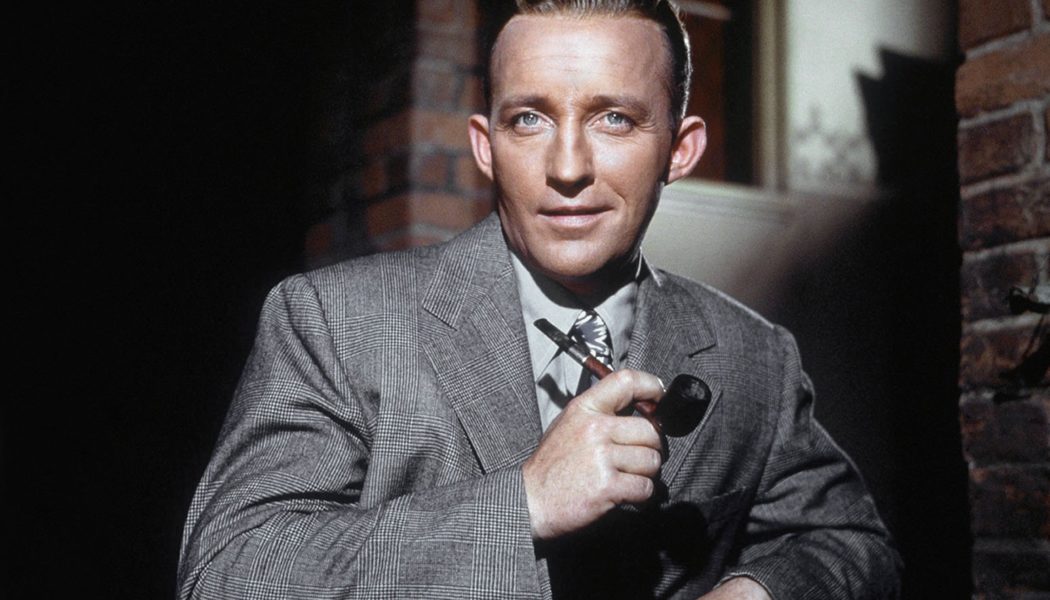
By October 31 it was number one on Billboard. And it stayed there until Tommy Dorsey’s “There Are Such Things” dethroned it on January 16, though it would top the charts again over the holidays in following years. On November 16 it also topped the CBS radio show Your Hit Parade’s weekly chart of the nation’s most popular songs and would remain at number one for an unprecedented ten weeks. Not a carol exactly, certainly not a religious song, “White Christmas” brought nostalgia into mainstream culture like nothing else ever quite had. It was inevitable then that it became the biggest single of all time—fifty million recordings sold of both the 1942 version and Crosby’s 1947 rerecording, which was necessary because the master cylinder of the original was nearly worn down, it had been copied so much. It’s still the highest-selling record of all time, and there’s nothing to indicate that anything will ever dethrone it.
Somehow, like Babe Ruth pointing his bat at the outfield to mark where he intended to hit a home run, Berlin had called it. When he walked into his office at 799 Broadway in New York City on Monday, January 8, 1940, he told his arranger Helmy Kresa, “I want you to take down a song I wrote over the weekend. Not only is it the best song I ever wrote, it’s the best song anybody ever wrote.” The market for Christmas songs wasn’t even especially massive at the moment; popular interest in Christmas carols had been revived by Bing Crosby only in 1935, with his smash-hit recordings of “Silent Night” and “Adeste Fideles.” Very quickly, Berlin, then fifty-one and riding almost three decades of extraordinary success as America’s favorite songwriter, settled on Crosby as the man to sing his new creation.
In the weeks leading up to Christmas 1942 its popularity exploded as a kind of sonic encapsulation of everyone’s desire for a return to home and the simple pleasures of normal life. For the troops, it became an anthem. As cultural historian Jody Rosen writes, “It aired on Armed Forces Radio request programs. It was played on jukeboxes in USO halls and PX stores. It arrived in the recreation kits that the military had developed in recognition of the importance of music in boosting troop morale . . . Above all the song appealed to servicemen in the warmest climes—posted on Guadalcanal in the Pacific, heading into combat in North Africa.” There had been a flurry of other wartime songs. To take the top spot on Your Hit Parade’s chart, “White Christmas” dethroned the Merry Macs’ “Praise the Lord and Pass the Ammunition.” But “White Christmas” succeeded precisely because, unlike all those other wartime songs, it wasn’t about getting hopped up to fight but about the dreams that keep us going, the Gatsby-esque hope that we could re-create cherished memories of the past in whatever present reality we faced—even if you were in Algiers or New Guinea. Rosen writes, “‘White Christmas’ was no ‘Over There.’ It was an ‘over here’ . . . inciting patriotism in its most primal form: homesickness.” This was the sonic equivalent of that new type of wartime movie, the home front film.
How remarkable that the most beloved Christmas song ever was an American pop tune written by a Jewish immigrant from Russia? Berlin was born Israel Baline in the town of Tyumen, located 1,300 miles east of Moscow in a remote part of Siberia. His earliest memory was at age four, when his Christian neighbors went on a pogrom against local Jews and set Berlin’s home ablaze—these pogroms often happened on Christian holidays. It may well have been Christmas. Flash-forward to December 25, 1928, over thirty years after Berlin immigrated to America, and the songwriter’s twenty-four-day-old son died suddenly. Given such a history, it would have made sense if Berlin tried to avoid Christmas altogether. Instead he turned his pain into a melancholy Yuletide masterpiece: a mission statement not about fighting what we hate but saving what we love.
If that isn’t an American Dream worth cherishing, what is?
Excerpted from HOLLYWOOD VICTORY: The Movies, Stars, and Stories of World War II by Christian Blauvelt. Copyright © 2021. Available from Running Press, an imprint of Hachette Book Group, Inc.











